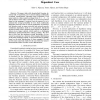Free Online Productivity Tools
i2Speak
i2Symbol
i2OCR
iTex2Img
iWeb2Print
iWeb2Shot
i2Type
iPdf2Split
iPdf2Merge
i2Bopomofo
i2Arabic
i2Style
i2Image
i2PDF
iLatex2Rtf
Sci2ools
101
click to vote
CDC
2008
IEEE
2008
IEEE
Distributed hypothesis testing with a fusion center: The conditionally dependent case
Abstract— The paper deals with decentralized Bayesian detection with M hypotheses, and N sensors making conditionally correlated measurements regarding these hypotheses. Each sensor sends to a fusion center an integer from {0, 1, .., D − 1}, and the fusion center makes a decision on the actual hypothesis based on the messages it receives from the sensors so as to minimize the average probability of error. Such conditionally dependent scenarios arise in several applications of decentralized detection such as sensor networks and network security. Conditional dependence leads to a non-standard distributed decision problem where threshold based policies (on likelihood ratios) are no longer optimal, which results in a challenging distributed optimization/decision making problem. We show that, in this case, the minimum average probability of error cannot be expressed as a function of the marginal distributions of the sensor messages. Instead, we characterize this probability based on the...
| Added | 29 May 2010 |
| Updated | 29 May 2010 |
| Type | Conference |
| Year | 2008 |
| Where | CDC |
| Authors | Kien C. Nguyen, Tansu Alpcan, Tamer Basar |
Comments (0)

